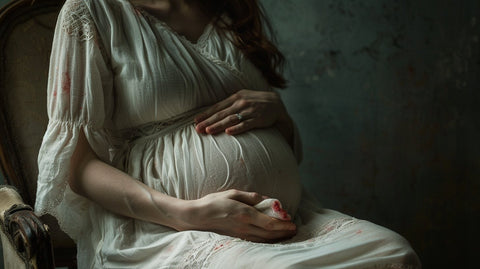Spotting Guide: Management of Atypical Bleeding
What is Spotting?
Spotting refers to those unexpected moments when you find blood stains outside of your menstrual period. Have you ever been surprised with your favorite underwear stained without being in your days? That's what we call spotting.
Understanding Spotting: A Detailed Look
This phenomenon manifests itself as small amounts of blood that are not part of regular menstruation. Unlike normal periods, spotting is less abundant, appears sporadically in the form of drops, is usually darker in color and is not accompanied by pain.
The Functionality of Menstrual Garments During Spotting
Nowadays, many women choose to wear specialized menstrual underwear during these episodes. Menstrual panties, such as menstrual thongs or the well-known menstrual panties, are ideal for managing these small bleedings. These garments are not only comfortable but also highly absorbent, allowing you to continue with your daily routine without worry and without the need to wear panty liners. Discover how Luna Roja can transform your days. We offer shipping to Colombia, Mexico, Canada and the United States. Visit our website and explore our range of menstrual panties designed with you in mind. Click here to start your journey to greater comfort and confidence!

Spotting: A Frequent and Generally Harmless Phenomenon
Spotting can appear at any time during the menstrual cycle and is more common than many people believe. Although it may be alarming initially, it is usually not a cause for concern. This light bleeding can occur during pregnancy, after sexual intercourse, a gynecological exam, or simply between menstrual periods.
How long does Spotting last?
Spotting is usually a punctual event and not cyclical, thus differentiating it from regular menstruation. If spotting becomes a recurring event, it is crucial to consult a doctor as it could indicate an underlying medical condition. The duration of spotting varies from one woman to another, but it is generally brief and not abundant, limited to a few drops of dark blood that barely stain the underwear.
Common Causes of Spotting
Ovulation and Spotting
A common cause of spotting is ovulation. During this natural process, the release of an egg can cause small spots of blood, especially if there is an increase in estrogen levels without the egg being fertilized. This link between ovulation and spotting is crucial to understanding why this phenomenon occurs.
The First Menstruations
Spotting can also be an indication of the first periods in adolescents. This is usually brown and discontinuous, reflecting the hormonal changes that the body is beginning to experience. To help adolescent girls better manage this new stage, specific pants have been designed that adapt to their morphology, providing comfort during these first cycles.
- You may be interested in: How to Know When the First Day of Your Period Is? How Do I Know If My Menstrual Cycle is Normal?
Hormonal Disorders: Main Causes of Spotting

Hormonal imbalance is one of the main causes of bleeding that occurs outside of the regular menstrual cycle, known as spotting. Estrogen and progesterone, key hormones in regulating the female cycle, when they are not in tune, can cause these episodes of light bleeding.
Factors that Induce Hormonal Disorders
Several factors can trigger a hormonal disorder. Changes in the hormonal contraceptive method, such as starting a new one, changing it, or stopping it, are common causes. Not all women tolerate the hormones in these methods in the same way, and contraceptives with low doses of estrogen usually cause more spotting than those with higher doses. In addition, forgetting to take the contraceptive pill can lead to unexpected bleeding. However, it is crucial not to abruptly stop contraception without consulting a healthcare professional.
Medical Consultation: Always the Best Option
If there are noticeable changes or concerns about the bleeding pattern, the recommendation is always to speak with a doctor, gynecologist or midwife. In many cases, minor adjustments in the type or dose of contraceptive are enough to restore hormonal balance. If problems persist, your health care provider may suggest an alternative birth control method.
Other Factors That Affect Hormonal Balance
Not only changes in contraception affect hormonal balance. Stress, fatigue, intense emotions, jet-lag and conditions such as premenstrual syndrome or premenopause can also trigger spotting. In these cases, resting and managing stress can help normalize the situation.
Spotting During Pregnancy: What to Expect
Spotting is also common during pregnancy, especially in the early stages. Implantation hemorrhages occur when the embryo implants in the uterus and, although they can be alarming, they are generally benign. It is important to note that during the first three months of pregnancy, small bleeding can coincide with the expected menstruation dates, without affecting the course of the pregnancy.

Medical Attention: Essential for Any Anomaly
Spotting can also be related to complicated pregnancies, such as premature or ectopic pregnancies, and spontaneous abortions. If you have the slightest doubt or concern, consulting a doctor is essential to ensure the health of both the mother and the baby.
Spotting After Sexual Intercourse or Gynecological Exams
It is common to experience slight bleeding after a sexual encounter or a gynecological examination. This can be due to several reasons, such as lack of lubrication or vaginal dryness. Although it can be worrying, losing a small amount of blood occasionally is normal and is not usually indicative of serious problems.
Relationship Between Gynecological Diseases and Spotting
Spotting can also be a symptom of more serious medical conditions, such as sexually transmitted infections, uterine fibroids, polyps, endometriosis, endometritis, or adenomyosis. Most of these are treatable with early diagnosis, so it is vital to maintain regular visits with your gynecologist for early detection and effective treatment.

Exploring the Connection Between Spotting and Ovulation
Although most women do not experience bleeding during ovulation, some may notice small monthly bleeding. This phenomenon, known as ovulation spotting , is generally normal and should not cause alarm.
Causes of Ovulation Spotting
- Hormonal Fluctuations: During ovulation, the body experiences significant changes in hormonal levels. An increase in progesterone seeks to maintain and strengthen the endometrium, but if the level is not high enough when estrogen decreases, it can result in light bleeding.
- Follicular Rupture: Another possible explanation is the rupture of the ovarian follicle during the release of the egg. This event can damage small adjacent blood vessels, thus causing spotting.
Identification of Ovulation Spotting
Ovulation spotting generally occurs in the middle of the menstrual cycle, coinciding with the release of the egg. It is characterized by light bleeding that lasts a few hours or up to two days. In addition, it may be accompanied by tension in the lower abdomen or slight discomfort, generally on the side of the ovary that is ovulating.
Introduction to Spotting Management
Spotting is a common phenomenon that many women experience at some point in their lives. Although in most cases it is not serious, knowing how to manage it can significantly contribute to your well-being. Important: these tips do not replace medical consultation. If you experience prolonged, profuse, or accompanied by pain spotting, it is crucial to consult a doctor or gynecologist.
How to Stop Spotting Caused by Contraceptives
Contraceptive Adjustment
An imbalance in hormone levels, especially estrogen, often results in spotting. This usually occurs when oral contraceptives are not well adjusted to the body's hormonal needs. Switching to a type of birth control that better meets your hormonal needs can be an effective solution. Remember, you should never stop taking your contraceptive without first consulting a professional, as doing so could reduce its effectiveness and increase the risk of an unwanted pregnancy.
Post-Implant Spotting
Between 10 and 20% of women may experience spotting after having a contraceptive implant placed. This type of spotting is generally caused by the progestogen in the implant, which in addition to stopping ovulation, can weaken the endometrium. If symptoms persist, talking to your doctor about adding an estrogen supplement may help.
Natural Remedies to Stop Spotting
Phytotherapy and Supplements
Natural treatments can be an excellent alternative to manage spotting gently but effectively. Here we leave you some options:
- Vitamin and mineral supplements: Adding vitamins A, B, C, and K1, as well as minerals such as iron and magnesium, can help strengthen your body and balance your hormones.
- Use of progesterone creams: These can be useful, but should always be used under medical supervision to avoid incorrect doses and side effects.
-
Ginger tea: Known for its anti-inflammatory properties, ginger tea can help regulate prostaglandins, which influence inflammatory processes and pain. However, it should be consumed in moderation as it has diuretic effects that can lead to imbalances if consumed in excess.

Can Ibuprofen Stop Spotting?
Ibuprofen is known for its effectiveness in relieving pain and may also be useful in managing spotting. This over-the-counter medication can help control minor bleeding. However, it is crucial to follow dosage directions to avoid side effects. If you have doubts, it is best to consult a health specialist.
Sex Life and Spotting: Are There Any Restrictions?
The good news is that you can continue with your sex life! Spotting alone does not prevent sexual relations. However, it is important to remember that spotting does not exempt you from using contraceptive methods, as it does not protect against unwanted pregnancies or sexually transmitted diseases.
When Should You Consult the Doctor?
Although spotting is generally not a sign of something serious, there are situations in which it is advisable to seek medical advice:
- Duration and Consistency: If the spotting persists for more than ten days or becomes a more regular flow.
- During Pregnancy: Any bleeding during pregnancy requires immediate attention.
- Associated Pain: If spotting is accompanied by pain or cramps, it is crucial to consult.
- Unprotected Sexual Relations: If you have had unprotected sexual relations, it is important to rule out causes of infections or related complications.
Importance of Medical Consultation
Only a doctor or gynecologist can give you an accurate diagnosis and prescribe appropriate treatment. Do not hesitate to ask if you have any concerns: prevention will always be better than cure.
Conclusion: Take Control of your Health
Spotting is a common phenomenon that often resolves on its own, but knowing its causes and how to handle it can make you feel more confident and prepared. If spotting becomes a constant concern, do not hesitate to seek professional help to receive the appropriate treatment and keep your health in optimal condition.
Because your comfort is non-negotiable

Discover the secret of menstrual panties
These articles may also interest you:
They're cool, I really liked them a lot. And they are very pretty. I want to buy another model to see how it goes.
I loved. It is super comfortable, I loved the material, it exceeded the expectations I had, I was a little afraid of using it and having accidents, however it worked super well for me!
It is very soft and comfortable. I don't know what happens even a little bit



















